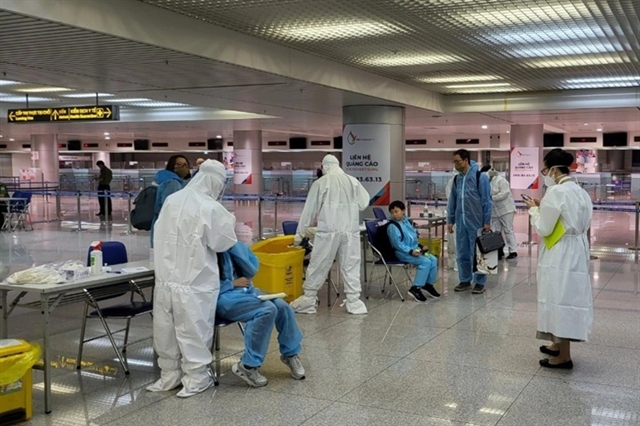 Society
Society


|
| People take rapid COVID-19 test at HCM City's Tân Sơn Nhất Airport. — Photo provided by the city's Centre for Diseases Control |
HÀ NỘI — The Civil Aviation Administration of Việt Nam (CAAV) has called on the ministries of Transport and Foreign Affair not to arrange repatriation flights to land at Nội Bài and Tân Sơn Nhất airports to avoid overcrowding at airport rapid COVID-19 testing sites.
According to the Dispatch No 9406/CD-VPCP of the Government Office issued on December 23, 2021, on strengthening control of the new strain Omicron of the SARS-COV-2 virus, air passengers to Việt Nam from countries with the Omicron variant must undergo pre/post-boarding rapid testing.
During the operation of international flights, the CAAV received requests from airlines calling for a cancellation of the pre/post-boarding rapid testing. Instead, the airlines suggested that passengers be required to show a negative testing result for COVID-19 within 48 hours instead of 72 hours before their entry.
According to CAAV, many airports in other countries do not offer the rapid SARS-CoV-2 test services.
The service is available in some airports but the testing fee is high, for example, US$270 per test in Japan. Moreover, waiting for the tests and results after arriving at airports causes congestion, particularly once many other international flights are resumed and arrive at the same time.
On January 7, the Ministry of Transport proposed to the Prime Minister to allow the uniform application of regulations on pre-boarding COVID-19 testing according to international practices applied in the past without requirement on pre/post-boarding rapid testing.
In the past few days, to minimise congestion at rapid testing areas at the two major international airports of Nội Bài and Tân Sơn Nhất, the CAAV closely coordinated with airlines to arrange the arrival time of international flights.
However, Việt Nam faces difficulties adjusting the arrival time of regular international commercial flights, which depart from other countries. Meanwhile, repatriation flights are charter ones that are operated more flexibly, especially regarding the landing point in Việt Nam.
In the past, most repatriation flights, which offer a package of air tickets, COVID-19 testing and selected quarantine accommodation for Vietnamese citizens were arranged to land at Vân Đồn, Đà Nẵng and Cam Ranh international airports. As a result, the repatriation flights did not affect the activities at Nội Bài and Tân Sơn Nhất international airports.
However, the two airports have seen overcrowding at rapid COVID-19 testing areas because of increased repatriation flights and returnees.
From January 4 to 7, a total of 47 international flights arrived in Việt Nam including 16 regular commercial flights, 20 repatriation flights and 11 flights that carried experts and tourists.
Of the flights, 15 landed Tân Sơn Nhất Airport and 23 at Nội Bài. Three repatriation flights carrying 640 returnees landed at Tân Sơn Nhất airport and eight repatriation flights carrying 1,754 returnees landed at Nội Bài, accounting for about 50-60 per cent of total air passengers on international flights. — VNS




